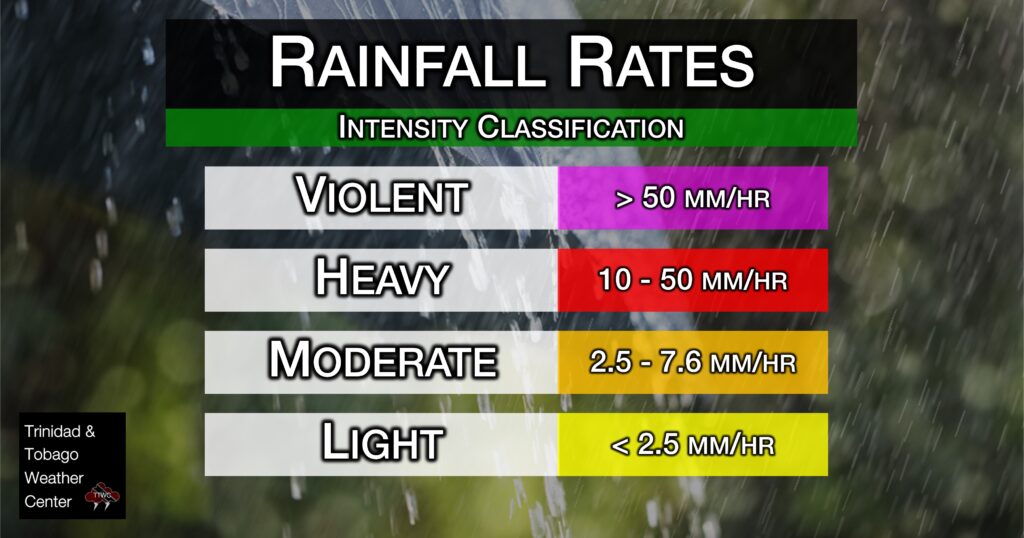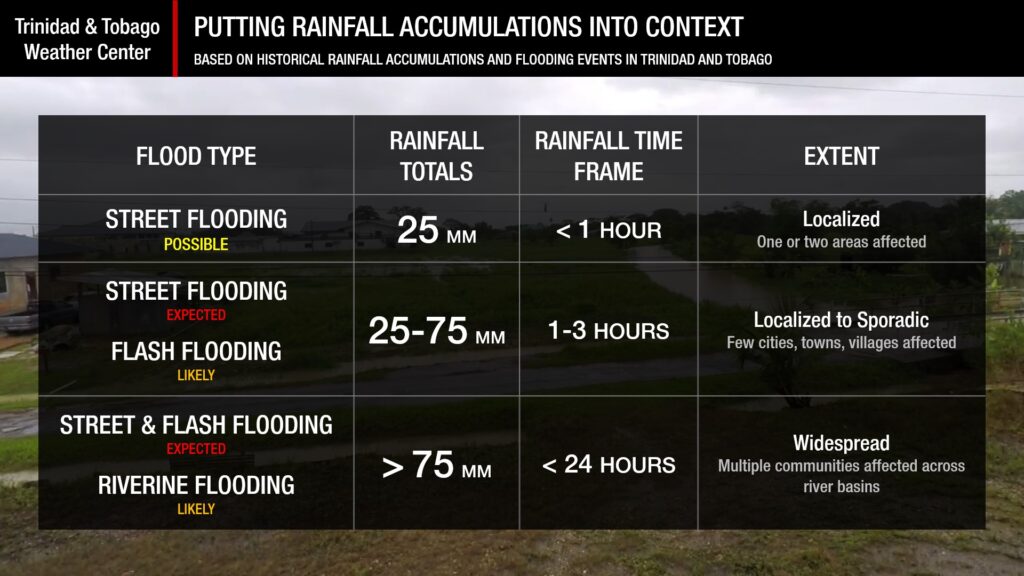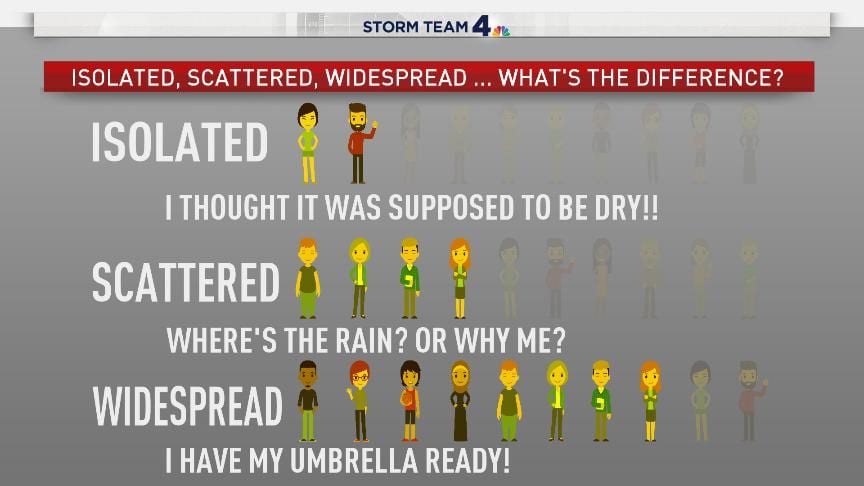With the Intertropical Convergence Zone lingering across and near T&T over the next five days, there is a daily chance of thunderstorms across mainly Trinidad, a norm for the Wet Season. However, with temperatures on the rise yet again, this late morning through afternoon downpours could bring some needed heat relief.
What you need to know
— Rainfall: Over the next five days, between 10 and 25 millimeters are forecast across Trinidad and Tobago, with areas along eastern Trinidad and coastal areas receiving up to 50 millimeters. In isolated areas across western and eastern coastal Trinidad, locally higher amounts are possible daily.
— Saharan Dust: Elevated Saharan Dust concentrations are forecast across T&T, particularly from August 14th.
— Hazards: Over the next five days, the main hazards will be localized street/flash flooding and gusty winds exceeding 45 KM/H in heavy showers and isolated thunderstorms. The threat of gusty winds will be elevated on Thursday and Sunday.
— Marine: Seas are forecast to be slight to moderate, with waves in open waters ranging between 1.0 and 1.5 meters, while in sheltered areas, seas are forecast to be near calm, with waves remaining below 0.5 meters.
Latest Alerts
TTMS Issues Adverse Weather Alert For T&T
Trinidad and Tobago is NOT under any tropical storm or hurricane threat, watch, or warning at this time.
The Forecast
Thursday
ThursdayFriday
FridaySaturday
SaturdaySunday
SundayMonday
MondayMarine Forecast
Slight to Moderate Seas Forecast For T&T
Temperatures
Thursday
Low: 25-27°C
High: 32-35°C
Friday
Low: 25-27°C
High: 32-36°C
Saturday
Low: 25-27°C
High: 32-36°C
Sunday
Low: 25-27°C
High: 29-32°C
Monday
Low: 24-26°C
High: 30-34°C
Over the next five days, maximum high temperatures are forecast to be hot, ranging from 29°C to 36°C, with higher temperatures across urbanized areas of Trinidad, particularly after Thursday, where in built-up areas, maximum high temperatures are likely to exceed 34°C. Minimum lows are forecast to remain mild, ranging between 24°C and 27°C in Trinidad and Tobago, trending marginally cooler in interior areas. The heat index will generally be above 30°C through the forecast period and higher than 35°C from Friday.
Forecast Impacts
Flooding
FloodingForecast Rainfall Totals
- Thursday: Between 5 and 10 millimeters across T&T, with isolated totals up to 20 millimeters favoring eastern and southern areas of Trinidad. In highly isolated downpours, favoring but not limited to the western half of Trinidad, local rainfall totals will exceed 25 millimeters.
- Friday: Between 0 and 10 millimeters of rainfall across T&T, with isolated rainfall amounts up to 25 millimeters favoring eastern and southern coastal Trinidad, as well as areas where isolated thunderstorms develop.
- Saturday: Little to no rainfall across the country, with isolated totals nearing 10 millimeters across western and hilly areas of both islands. In thunderstorm activity, locally higher totals are possible.
- Sunday: Between 5 and 15 millimeters of rain across T&T, with isolated totals exceeding 20 millimeters across eastern coastal Trinidad, as well as northern and western areas of both islands. In thunderstorm activity, locally higher totals are possible.
- Monday: Between 5 and 15 millimeters of rain across T&T, with isolated totals exceeding 15 millimeters across eastern coastal Trinidad, as well as northern and western areas of both islands. In thunderstorm activity, locally higher totals are possible.
Understanding Rainfall Rates

Understanding Rainfall Accumulations
Putting the rainfall forecast into context, rainfall rates in excess of 50 millimeters per hour or areas that receive in excess of 25 millimeters within an hour tend to trigger street flooding across the country or flash flooding in northern Trinidad. For riverine flooding to occur, a large area of the country (not just in highly localized areas of western coastal Trinidad) would have to record upwards of 75 millimeters within 24 hours, and rainfall would have to fall across major rivers’ catchment areas.

Strong Thunderstorms
Strong ThunderstormsWhat is a strong or severe thunderstorm?
Given how rare these types of thunderstorms are in our region – we classify a severe or strong thunderstorm as one that produces any of the following:
- Damaging wind gusts exceeding 55 KM/H;
- Frequent lightning (more than 30 cloud-to-ground strikes within a 10-minute period);
- Hail (of any size);
- Rainfall of more than 50 millimeters or more within an hour or exceeding 75 millimeters or more within three hours;
- The sighting of a funnel cloud or touchdown of a waterspout/tornado associated with the thunderstorm.
Gusty Winds
Gusty WindsPossible impacts include localized wind damage to trees, power lines, and small structures. Small potted plants may blow over with light outdoor objects becoming airborne in stronger gusts. Tents may jump.
Other Hazards
Saharan Dust Forecast
Dust-Free Days Ahead For T&T As Saharan Dust Stays North
Why I May Not/Will Not See Rainfall?
A frequent complaint is the forecast is wrong because I didn’t experience any rainfall. Scattered showers mean that you, individually, may experience some showers intermittently throughout the day, and there is a higher chance for this activity than isolated activity. Widespread showers mean that nearly all persons and areas may experience rainfall.
During the forecast period, isolated to scattered rainfall is forecast, with isolated activity favoring Friday into Saturday.

Forecast Discussion
Tropical Update
Tropical Update: Atlantic Remains Quiet, Tropical Wave To Bring Rainfall To T&T
Periodic heavy showers and thunderstorms moved across the Windward Islands on Wednesday associated with Tropical Wave 32, with stronger activity remaining north of T&T as forecast.
Convergence trailing this tropical wave, as well as daytime heating, the influence of the Intertropical Convergence Zone (ITCZ), favorable upper-level divergence, and sea breeze convergence along western coastal areas, will lead to isolated to scattered showers across both islands on Thursday, with isolated thunderstorms possible, particularly during the late morning through the afternoon. Gusty winds are likely to accompany heavy downpours as low-level winds remain elevated following TW32, which may make its way to the surface in rainfall.
At the low levels, a high-pressure ridge is forecast to regain dominance across T&T on Friday, but with the country remaining on the periphery of this system, low-level convergence will support cloudiness and isolated showers or thunderstorms. While wind shear is forecast to be elevated, a mid to upper-level trough will provide ample support for stronger convection and possible severe thunderstorms. Notably, this severe risk lies north of Trinidad and near/north of Tobago.
By Saturday, a low-level trough is forecast to affect the Lesser Antilles, weakening surface winds and allowing for partly cloudy to mostly cloudy skies, interrupting a mostly sunny day. However, localized climatic effects like sea breeze convergence, daytime heating, and orographic effects will act as triggers for possible isolated late morning through afternoon showers and thunderstorms.
On Sunday, this trough is forecast to interact with the ITCZ, with Tropical Wave 33 moving across the Lesser Antilles, bringing with it an increase in atmospheric moisture. These conditions will support isolated showers and thunderstorms throughout the day, but a Saharan Dust surge is forecast overnight into Monday, which will limit rainfall into the upcoming week.
However, forecast models are still showing isolated to scattered showers associated with low-level convergence and the ITCZ into Monday, with Saharan Dust levels significantly increasing by Monday afternoon.
To note for north of T&T: As a result of favorable mid to upper-level conditions, cool mid-level temperatures, ample instability, and likely thunderstorms, forecast models show the potential for strong/severe thunderstorms north and east of T&T to the Leewards on Thursday into Friday, with an elevated potential for hail. Pay attention to the latest information coming out of your local meteorological offices.













